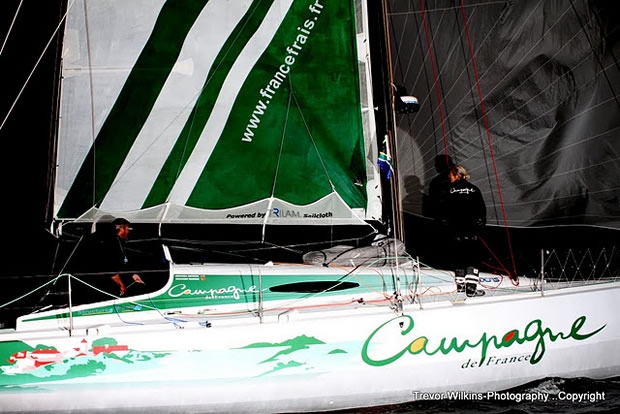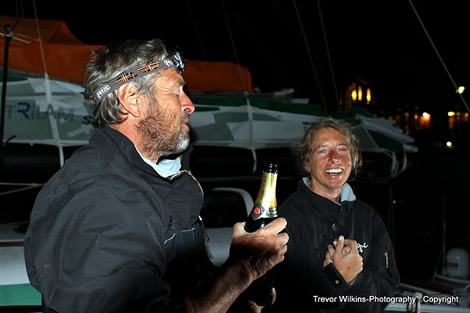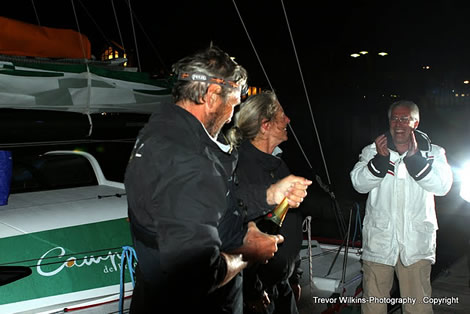Mabire and Merron home
In light airs of around six knots under a waxing crescent moon with floodlit Table Mountain as a backdrop, Halvard Mabire and Miranda Merron with their Pogo 40S², Campagne deFrance, crossed the Cape Town finish line completing Leg 1 of the double-handed, Class40 Global Ocean Race at 19:43:40 GMT (21:43 local) on Friday evening.
The Franco-British duo took 33 days 07 hours 43 minutes and 40 seconds, securing second place in the GOR’s fleet of six Class40s, arriving in South Africa just over 14 hours behind the Leg 1 winners, Ross and Campbell Field with Class40 BSL.
With mooring completed at North Wharf in the V&A Warterfront Marina, Mabire and Merron were successful in masking their disappointment at finishing the GOR’s Leg 1 in second place having led the fleet of six Class40s for 24 days, holding pole position for 75% of the course from Palma to the Cape Town stopover. Halvard Mabire had a quick answer for arriving in South Africa behind BSL: “We’re sharing an apartment with the Fields and if we arrived before them, they would be very upset as they couldn’t prepare the apartment for us,” claimed the 54 year-old Normandy sailor who has a long history of racing with his GOR adversary and friend, Ross Field. “So we sent our New Zealand maids ahead to put the beers in the fridge, make the beds and get everything ready.”
Mabire and Merron have spent 12 months working ceaselessly to prepare their GOR campaign, taking delivery of the bare hull and deck in September last year, fitting out the Class40 themselves and designing many of the systems and components. The result in Leg 1 is clearly a blow: “We are very disappointed,” admits Mabire who has identified one of the root causes as tactics following crossing the Fastnet Marine Scoring Gate at the islands of Fernando de Norohna off Brazil. “After Fernando we were faced with some reaching conditions where BSL is really, really fast.” The Fields’ Verdier-designed Tyker 40, launched in 2008 and raced in the 2008-09 GOR by the late Felipe Cubillos, is a formidable reaching weapon, but sluggish in light airs. “So, if we took the same course as them, we wouldn’t have any chance to catch them and we tried to reduce the number of miles which is why we stayed to the north, which was a mistake,” he explains.
The duo’s option of putting Campagne de France to leeward and cutting the corner across the South Atlantic to Cape Town resulted in the Fields overtaking a fortnight after the scoring gate, leading the fleet into Cape Town and adding only an extra 140 miles to the total distance sailed by BSL over Leg 1. There was an additional setback for Mabire and Merron. “We arrived in Fernando completely exhausted from preparing the boat,” says Mabire. “We saw the Fields pushing their boat much harder than us and they are very strong and very tough, like any Kiwi, and I think we just didn’t push hard enough."
There were already problems on Campagne de France before the scoring gate explains Merron: “Not with the boat itself, but with communications system, electronics and charging systems which are all really crucial when your competition has them up and running. If they had lost these systems at the same time, it would be a level playing field.” Repairing these systems when attached to the dock is challenging, but in fast reaching conditions, any attempt was near-impossible. “It’s really hard to fix these problems at sea and, of course, you’re not concentrating on making the boat go faster and missing out on decisions of where to place the boat and how to sail her,” she confirms. “We’ve barely had a chance to get to know the boat, so although we’re disappointed, we shouldn’t be,” says the upbeat Merron. Prior to the GOR start in September, the duo had made two short hops across the English Channel and the delivery from France to the GOR’s start port in Palma, during which most of the time was spent completing work on the boat. “We finished the accounts for the boat-build the day before the GOR start,” she adds.
Mabire and Merron have one month to repair and prepare Campagne de France for the GOR’s Leg 2 from Cape Town to Wellington, New Zealand. “The Southern Ocean isn’t a place to go lightly or unprepared,” says Merron who has already tasted the high-latitudes at the bottom of the planet. “So there’s a fair amount we’d like to do to get the boat really ready for the South.” With 300,000 miles of offshore sailing to his credit, including five Whitbread Round the World Races, Mabire is still aware of the challenge facing the teams for the remainder of the circumnavigation: “You can still dream of doing a round the world race in a 60-footer, but never find the money to go,” he explains. “With a Class40, you can more or less guarantee to be at the start with an immense amount of hard work, skill and imagination, but if somebody gets to the start of a round-the-world race on a Class40 and thinks it’s easy, he is making a very big mistake,” he warns. “It’s very, very, demanding.”
Campagne de France scores 31 points in GOR Leg 1 (6 points for crossing the Fastnet Marine Insurance Scoring Gate in 1st place + 25 points for finishing Leg 1 in second place) and BSL carries 25 points from Leg 1.
While both Class40 teams are busy working on their boats in the bright sunshine and carnival atmosphere of the GOR base in Cape Town’s V&Waterfront Marina, the four teams in the South Atlantic are spread over 376 miles dealing with a high-pressure system centred 1,400 miles southwest of Cape Town and blocking their path to the finish.
Leading the second wave of Class40s, Conrad Colman and Hugo Ramon with Cessna Citation are racing in isolation, north of the high-pressure in headwinds with 1,400 miles of Leg 1 remaining. In fourth place, Marco Nannini and Paul Peggs trail Colman and Ramon by 228 miles in DTF, but are much further south, fetching into the north-easterly breeze spinning off the western edge of the high-pressure with Financial Crisis. The Dutch duo of Nico Budel and Ruud van Rijsewijk are making the best speed in the group, averaging 9.3 knots in the 12:00 GMT poll on Saturday and approaching the high-pressure from the north with Sec.Hayai trailing Nannini and Peggs by 120 miles. The South African duo of Nick Leggatt and Phillippa Hutton-Squire in sixth, furthest south at 38 degrees and west of the high’s centre with Phesheya-Racing, are 1,800 miles from their home port and the finish line.












Latest Comments
Add a comment - Members log in